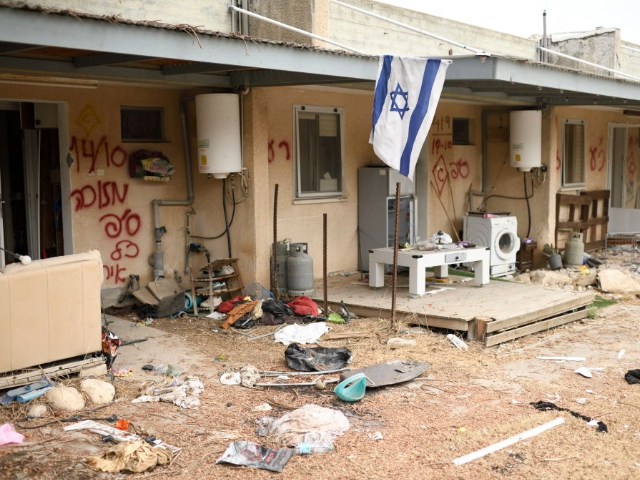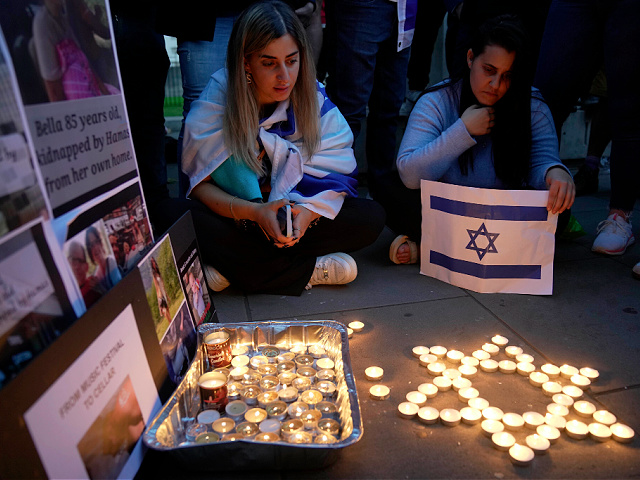
The Argentine news outlet Infobae reported on Sunday, citing “sources familiar with the details of the [hostage] agreement,” that the jihadist terrorist organization Hamas does not know the location of some of the estimated 240 people abducted from Israel on October 7, complicating the group’s ability to negotiate for their release.
The Qatari Prime Minister Sheikh Mohammed bin Abdulrahman al-Thani appeared to verify that report on Sunday, telling the Financial Times that some of the hostages were “missing” and that Hamas would allegedly use the time bought in a truce Israel agreed to in exchange for the release of hostages to find others they have allegedly lost. Qatar allows Hamas, a genocidal jihadist terror organization, to maintain its “political” operations base in Doha and has been helping Hamas communicate with the government of Israel and its allies.
The whereabouts of the hostages not in direct Hamas custody remain unknown. Palestinian Islamic Jihad (PIJ), a rival terrorist group, reportedly claimed to be keeping 30 of those hostages imprisoned. Some reports have suggested that organized crime syndicates in Gaza, which Hamas controls, may be keeping individual hostages or families in captivity independent of direct Hamas control.
Hamas took its hostages on October 7 as part of a massive, unprecedented terror assault it has dubbed the “al-Aqsa flood.” On that day, the jihadists invaded Israel and began indiscriminately killing civilians, raiding residential communities and executing entire families in door-to-door attacks. The terrorists filmed themselves abducting people, killing them, torturing them, desecrating the bodies of victims, and posted many of the videos to social media, including the profiles of their victims. Eyewitness and forensic evidence indicate that the terrorists engaged in multiple acts of gang rape, including at least one killing in which a woman was shot in the head in the middle of a gang rape. Authorities have also found evidence of Hamas terrorists killing and mutilating children, including decapitated and charred bodies of babies. Israeli officials estimate the death toll of the “al-Aqsa flood” to be upwards of 1,200 people.

The aftermath of Hamas’s attack on Kibbutz Kfar Aza, one of the hardest-hit communities in the October 7 onslaught by Hamas, on October 27, 2023. (Gili Yaari/NurPhoto via Getty Images)
The Israeli government agreed to a four-day pause in its military activities in Gaza intended to prevent Hamas from staging a similar attack in the future in exchange for the release of several hostages. Hamas terrorists threatened to break the agreement this weekend but ultimately agreed to free some hostages in exchange for Israel releasing a much larger number of convicted terrorists. The latest group of hostages released on Sunday was made up of 14 people, including a four-year-old American whose parents Hamas terrorists killed on October 7.
The remaining hostages include people from all over the world, including about 20 Argentines, according to Infobae. The outlet noted that the youngest known hostage, ten-month-old Kfir Bibas, is an Argentine national. Bibas’s four-year-old brother, Ariel, is also believed to be a hostage, as well as his parents, Shiri Silberman and Yarden Bibas.
Infobae’s sources claimed that Hamas does not have Bibas, his family, and several other hostages in its control.
“According to sources familiar with the details of the agreement, there are hostages who fulfill the criteria established by Hamas to be freed, but are not in the hands of Hamas but rather detained in the Gaza Strip by other terrorist organizations, such as the Popular Front for the Liberation of Palestine and Palestinian Islamic Jihad.”
On the Argentine family in particular, the sources claimed, “Hamas does not know who has them.”
Al-Thani, the Qatari top diplomat, told the Financial Times similarly that Hamas did not maintain control of all the hostages. He claimed that the number of “missing” hostages was over 40 people.
“If they get additional women and children, there will be an extension,” al-Thani was quoted as saying. “We don’t yet have any clear information how many they can find because … one of the purposes [of the pause] is they [Hamas] will have time to search for the rest of the missing people.”

People light candles during the Jewish Community Vigil for Israel in London, Monday, Oct. 9, 2023, two days after Hamas fighters launched an unprecedented, multi-front attack on Israel. (AP Photo/Kin Cheung)
Adding to the questionable nature of the information from Qatar, al-Thani claimed that Hamas terrorists insisted in its talks with Doha that it did not take civilian hostages, claiming that other terrorist groups and even individual Palestinian people were responsible for the abductions. That claim is easily refuted by ample video material uploaded online by Hamas terrorists on October 7. Hamas itself has also published propaganda videos of civilian hostages demanding, evidently under extreme duress, that Israel stop its anti-Hamas operations.
On Monday, the British news network Sky cited experts who described the current situation with the hostages as “terribly unclear.”
“There’s been a well-developed smuggling economy in Gaza for decades – long before Hamas took control – organised by networks of crime families. So it’s possible hostages are neither under the control of Hamas nor Islamic Jihad – but these crime organisations,” Hans-Jakob Schindler, senior director at the transatlantic thinktank the Counter Extremism Project, told Sky News.
Schindler added that Hamas wants “to use this hostage situation to their maximum benefit – because before 7 October, 70% of Gazans said they didn’t like Hamas and I don’t think it’s going to get much better.”
While Hamas itself may have seen an erosion in support from Gazans, reports in the aftermath of October 7 suggest that Palestinian civilians have played a role in the terror against Israel. Survivors of the attack on Kibbutz Nir Oz, one of the communities devastated on October 7, said they witnessed Palestinian civilians loot their homes, eat their food, and even use their Netflix accounts after Hamas had initiated the attack.
Roni Krivoi, one of the hostages released Sunday, reportedly escaped from his captors briefly after being abducted but Palestinian civilians “returned him to the hands of the terrorists,” according to aunt Elena Magid.




